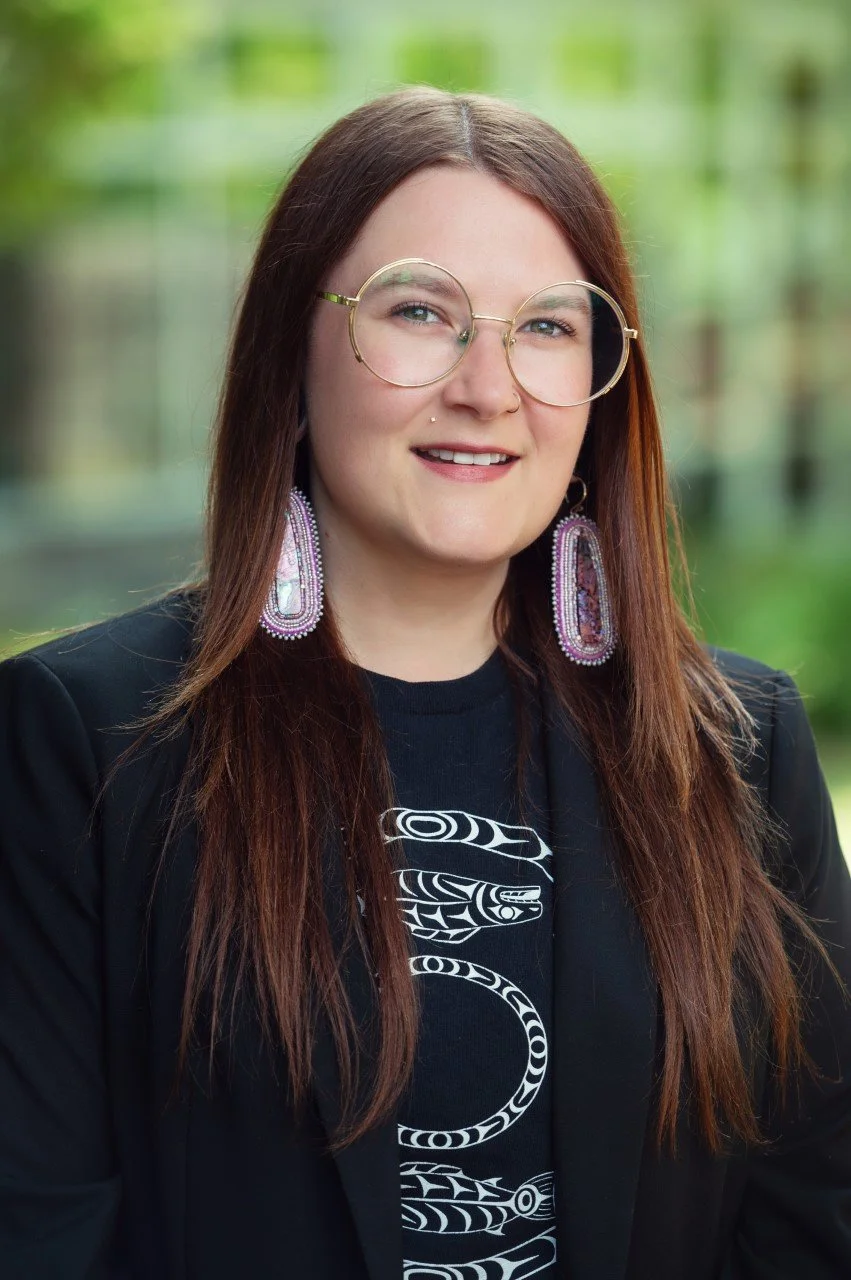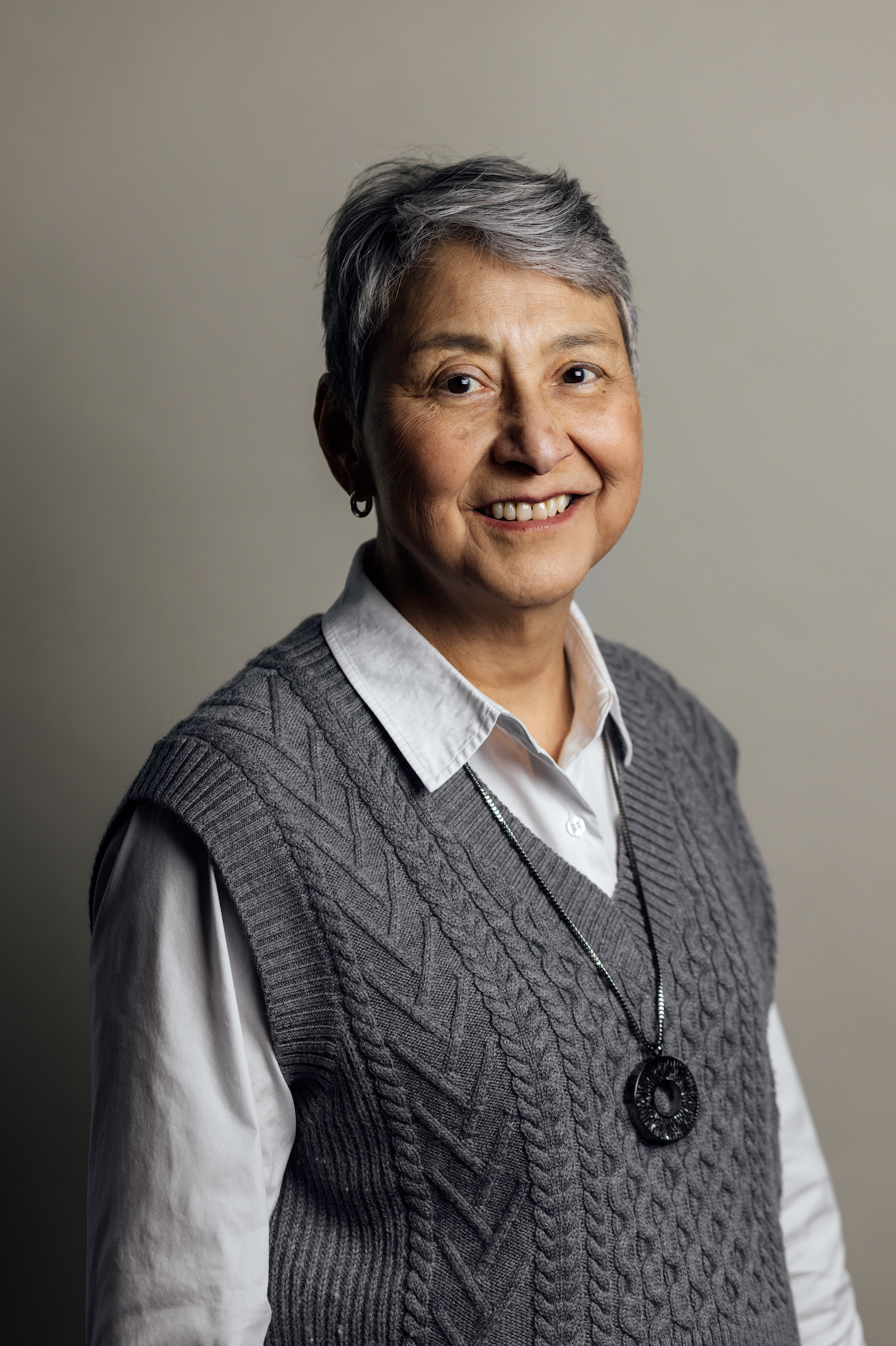2026 JURORS
Richard Van Camp
A recipient of the Order of the Northwest Territories, Richard Van Camp is a proud Tlicho Dene from Fort Smith, NWT, now living in Edmonton: Treaty 6 Territory with his family. Richard is an internationally renowned storyteller and award winning author of 30 books for all ages. His novel, The Lesser Blessed, is now a feature film on Prime Video, and his graphic novel with Neiva Mateus, Three Feathers, is now a feature film on APTN. He is a mentor with the Audible Indigenous Writers' Circle and he is The University of Victoria's Indigenous Storyteller in Residence where he teaches online about reclaiming family medicines. You can visit Richard on Facebook, BlueSky, Threads, Instagram, YouTube, SoundCloud and at www.richardvancamp.com
Photo by William Au
Smokii Sumac
Smokii Sumac is a Ktunaxa Two-Spirit and Transgender Poet, Podcast host, and emerging playwright. He is a two time Indigenous Voices Awards winner, first awarded in the unpublished poetry in English category, which lead to his IVA-winning collection you are enough: love poems for the end of the world being published in 2018. His podcast, The ʔasqanaki Podcast features a range of Indigenous guest musicians and writers including Tenille Campbell and G.R. Gritt. Most recently, he has been working on his first play Seven and One Heart with the National Queer and Trans playwriting unit, and he is proud to be a member of the xaȼqanaǂ ʔitkiniǂ (many ways of working on the same thing) project where he supports conversations around gender and sexual diversity throughout the research process, as the team asks the question qapsin kiʔin ʔakaǂxuniyam? What would a healthy community look like?.
Photo by sweetmoon photography
Emily Riddle
Emily Riddle (Okimâw Pipikwan Iskwêw) is Nehiyaw and a member of the Alexander First Nation (Kipohtakaw). She is a writer and textile artist based in Amisko Waciw Wâskahikan (Edmonton, Canada). In 2022, she released her first full length poetry collection, The Big Melt which won the Griffin Poetry Prize Canadian first book award. Her writing has been published in The Malahat Review, The Washington Post, The Globe and Mail, among others. Emily Riddle is a dedicated Treaty 6 descendant and a semi-dedicated Edmonton Oilers fan..
Otoniya Juliane Okot Bitek
Otoniya Juliane Okot Bitek is an assistant professor in Black Studies at Queen’s University in Kingston, which occupies the lands of the Anishinaabe and the Haudenosaunee people. She is the author of three books of poetry. Most recently, We, the Kindling, her first novel (2025, Alchemy, an imprint of Penguin Random House)was long-listed for the Giller Prize and shortlisted for the Atwood Gibson Writers Prize for Fiction, both 2025.
Kayla Lar-Son
Kayla Lar-Son is Metis/Ukrainian librarian from amiskwaciy and currently living on the traditional territory of the xʷməθkʷəy̓əm (Musqueam) peoples. She is the interim head of the Xwi7xwa library, and former co-host of masinahikan iskwêwak – Book Women Podcast.
Marilyn Dumont
Metis poet, writer, and Professor Marilyn Dumont teaches for the faculties of Arts and Native Studies at the University of Alberta and is proud of Metis family lines from her Mother’s - Vaness / Dufresne families and her father’s - Boudreau/Dumont families. She was awarded the 2018 Lifetime Membership from the League of Canadian Poets for her contributions to poetry in Canada. In 2019, she received the University of Alberta Distinguished Alumni Award and the Alberta Lieutenant Governor’s Distinguished Artist Award, and in 2022 was Awarded the Alberta Queen’s Platinum Jubilee medal for public service. Her four collections of poetry have won provincial or national awards: A Really Good Brown Girl (1996); green girl dreams Mountains (2001); that tongued belonging (2007); The Pemmican Eaters (2015). A fifth collection surrounding Indigenous history of Edmonton, called South Side of a Kinless River was published by Brick Books in 2024.
Tenille K. Campbell
Tenille K. Campbell is a Dene and Métis artist from English River First Nation, SK. She completed her MFA in Creative Writing at UBC and holds a Ph.D. in English from the University of Saskatchewan, specializing in Indigenous Literature. Her poetry collections, #IndianLovePoems (Signature Editions, 2017) and Nedi Nezu (Arsenal Pulp Press, 2021), focuses on Indigenous Erotica – using humour, storytelling, and sensuality to reclaim and explore ideas of Indigenous sexuality. She is the artist behind sweetmoon photography, specializing in capturing Indigenous stories throughout Canada. She currently resides in Saskatoon, SK.
Photo by Ali Lauren
Joanne Arnott
writer, editor, arts activist, mother of six/empty nester, originally from Treaty 1 territory, at home on the west coast. Long affiliated with Metis and mixed-blood people, current family research points to an all-settler ancestry. Joanne has published eight books and four chapbooks, as author, and as editor; projects include Honouring the Strength of Indian Women: Plays, Stories and Poetry by Vera Manuel (co-editor, University of Manitoba Press). Past recipient of Gerald Lampert Award (1992) and Vancouver Mayor’s Literary Arts Award (2017). Retired poetry mentor (The Writers Studio, SFU), and poetry editor (EVENT Magazine), Joanne is a lifetime member of the League of Canadian Poets and Surrey Muse. Books in print: Mother Time and A Night for the Lady (Ronsdale Press) and pandemic friendship (above/ground press).
Photo by Lila Arnott Campbell
2026 Contest closes on Friday, February 20th.
Le Prix voix autochtones
Nous sommes très heureux·ses d’annoncer un changement de leadership dans l’administration des prix pour les catégories francophones. À partir de cette année, c’est Kwahiatonhk!, un organisme à but non lucratif dédié au développement, à la promotion et à la diffusion de la littérature autochtone, avec le soutien de la Chaire de leadership en enseignement sur les littératures autochtones au Québec (Maurice-Lemire) de l’Université Laval, qui assurera l’administration des prix qui seront remis en juin prochain lors du festival Kwe!. Nous croyons sincèrement que cette nouvelle collaboration entre les Indigenous Voices Awards, Kwahiatonhk! et Kwe! permettra de mieux soutenir et représenter la communauté littéraire autochtone francophone en consolidant les liens avec le milieu. Demeurez à l’affut en consultant le site web et la page Facebook de Kwahiatonhk!.
French language Prizes now managed by Kwahiatonhk! and the IVAs/PVAs
Second Year of Changes in the French Prize
After a successful first year, the IVAs and Kwahiatonhk! continue to collaborate on French-language prizes.
See Kwahiatonhk! for inoformation about the Prix voix autochtones (PVAs), the French version of the IVAs
Beginning in 2025, to better support and represent the French-speaking Indigenous literary community, administration of the IVAs French-language prizes has become a collaborative effort between the IVAs and Kwahiatonhk!, a non-profit organization dedicated to the development, promotion and diffusion of Indigenous literature.
Administered by Kwahiatonhk! with the support of Université Laval’s Chaire de leadership en enseignement sur les littératures autochtones au Québec (Maurice-Lemire), and a committee composed of Louis-Karl Picard Sioui (Kwahiatonhk!), Marie-Eve Bradette (Chaire de leadership en enseignement sur les littératures autochtones au Québec), and Alec Mahoney (coordinator), the French prizes will be awarded in June during the Kwe! festival. Visit the Kwahiatonhk! website and Facebook page for dates and more information or email directly at pva@kwahiatonhk.com.










